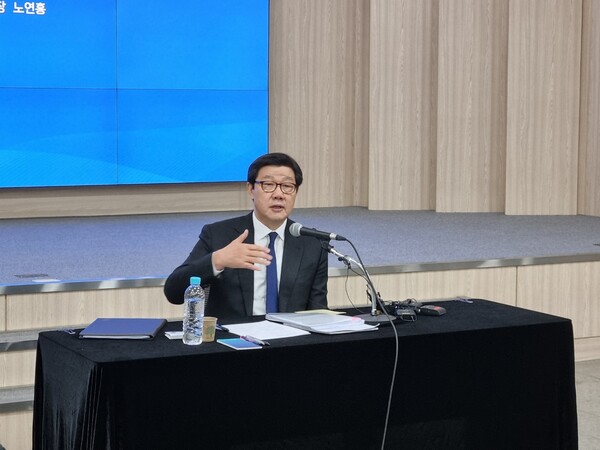For the sustainable growth of the domestic biopharmaceutical industry, the government must reform regulations to facilitate businesses’ investment, an industry leader said on Tuesday.
To this end, the design of a simple, clear, and predictable drug price system is essential, and the legal status of the Digital and Biohealth Innovation Committee launched last year should be guaranteed, said Noh Yun-hong, chairman of the Korea Pharmaceutical and Bio-Pharma Manufacturers Association (KPBMA).

Noh made these and other points at a news conference to propose policies to foster the biopharmaceutical industry under the theme “Strengthening Innovation Capacity to Leap to a Biopharmaceutical-Centered Country.”
Before the policy proposal, the KPBMA head reviewed the current status and achievements of the domestic biopharma industry.
He said the domestic pharmaceutical market was valued at 29.86 trillion won ($22.42 billion) in 2022, recording a 17.6 percent year-on-year growth. The biopharmaceutical market was valued at 5.16 trillion won, accounting for 17.3 percent of the pharmaceutical market. R&D investment by listed companies increased 23.9 percent year-on-year to about 4.39 trillion won. Drug self-sufficiency was 68.7 percent for finished drugs and 11.9 percent for raw materials known as active pharmaceutical ingredients (API).
The biopharma market not only expanded in size but also continued to make tangible progress. The R&D pipelines increased significantly from 573 in 2018 to 2,627 in 2022, and U.S. Food and Drug Administration (FDA) approvals increased from 14 in 2018 to 31 in 2022. Technology exports increased from 12 cases and 5.28 trillion won in 2018 to 20 cases and 7.94 trillion won. The total value of pharmaceutical exports also grew by 20.3 percent annually, from 5.14 trillion won to 10.78 trillion won.
There were also institutional improvements. The drug price compensation system that reflects the innovative value of new drugs was improved, and the prices of essential drugs and drugs with unstable supply and demand using domestic raw materials were added. The AI New Drug Convergence Research Center was launched, and K-MELLODDY (a project to accelerate AI new drug development based on associative learning) was promoted.
Chairman Noh said designing a predictable drug price system for companies to invest confidently is a top priority.
"The conditions for industrial advancement are maturing, as corporate investment is increasing and the government's industrial development policy is becoming visible, but the industrial base is weak due to the complex drug pricing system and unstable supply system of essential and raw materials" Noh said.
Implementing a simple, clear, and predictable drug pricing policy is essential to revitalize corporate investment," the KPBMA head said, adding that the association would closely analyze drug pricing finances to align with the government's drug pricing policy.
“In addition, the government should also continue to promote the implementation of domestic incentive systems for essential drugs and APIs highly dependent on imports and regulatory innovations based on public-private partnerships to strengthen industry competitiveness,” he said.
Noh also commented on the operation of the recently launched Digital and Biohealth Innovation Committee.
"The domestic biopharma industry has excellent human resources and research capabilities to develop innovative new drugs. However, due to scale limitations, there are realistic constraints that require high selection and focus to achieve results," Chairman Noh said. "The proactive and stable operation of the Digital and Biohealth Innovation Committee will increase the proportion of government R&D investment in companies and ensure that support is focused on late-stage clinical trials."
To this end, the association will quickly prepare the legal basis for the stable operation of the committee, he said, adding that although the industry group is unsure of the passage of some proposed bills due to the general election, it would continue to prepare the legal basis with the help of the Ministry of Health and Welfare.
"We are aware of the questions about the instability of the Digital and Biohealth Innovation Committee as it is an organization based on a decree," he said. “However, as the committee is an official government organization, it must implement the resolved issues. We will solidify the committee's status through amendments to the law to ensure its actual status. We will do our best to move quickly this year to dispel concerns and solidify the inner workings of the Digital and Biohealth Innovation Committee."
In conclusion, Chairman Noh said, "Despite Korea’s competitive AI, ranked sixth worldwide, there is a lack of AI drug development infrastructure that can be jointly utilized by the industry, such as a healthcare data collection, integration, and provision system to accelerate new drug development. We need intensive support for AI technologies that increase the success rate of new drug development, such as K-MELLODDY, a project to accelerate new drug development based on associative learning."
Related articles
- ‘Low drug prices hinder Korean pharma industry's global competitiveness’
- ‘To develop AI-based new drugs, match technology demanders and suppliers’
- 'API self-reliance key to pharmaceutical sovereignty'
- ‘Korea's biopharma industry needs more Innovation to stand out among competitors’
- KPBMA welcomes adding biopharma sector to national hi-tech strategic industries
- KPBMA head named to chair Korea's healthcare reform panel

